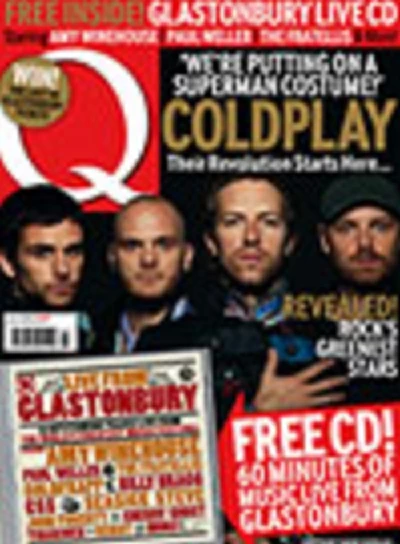Miscellaneous
-
June 2008
published: 24 /
5 /
2008

In the latest in his 'Condemned to Rock 'n' Roll' column Ben Howarth questions the current state of music journalism and if music writers are doing an effective enough job
Article
Though the NME’s historical aura has allowed it to maintain a mythical status amongst music fans, even including those of us that wouldn’t dream of reading the damned thing, there is little disputing which part of the music press is now the most influential - 'Q' magazine, having remained for many years both the most widely read and the most likely to have a best selling artist on its cover (the last four to lend 'Q' their names and stadium sized fanbases are REM, Madonna, Foo Fighters and Coldplay).
Q’s dominance of the music press is as total as the Premier League’s dominance of UK Sport. Having vanquished traditional competition, and just as Football now comes up against international rivals Basketball and Ice Hockey, Q’s only serious rivals come from the digital sector. 'Mojo' and 'Uncut' have admittedly carved out niches for that certain kind of person as interested in rock’s past as its present, yet not quite insane enough for Record Collector. But their readers are much like cricket and rugby fans - expecting survival in a changing world, but never the attention they were once granted as a right.
Extensive album review sections should be a music magazine’s primary attraction. After all, long term fans have their eyes only on one thing - what to buy next. Indeed, Q’s success in wrestling influence away from the 'NME' and the now defunct weeklies owes much to its rigorous star rating system, devised more for its readers than its writers. ***** was offered only to the most deserving albums, while *** did not mean average but the much more useful, "good - not for everyone, but fine within its field."
This system worked because it reined writers in. I’m struck by how often 'Q' in particular gives out three stars. See for yourself that it is the score given to almost every album reviewed last month. Mojo is braver (a ***** review for Bon Iver’s 'For Emma, Forever Ago' was a well calculated risk), but even here a review of the Willard Grant Conspiracy’s 'Pilgrim Road' could find room only for praise, and still was accompanied by just ***.
Compare that with the indie publications, 'Plan B' or its online equivalent 'Pitchforkmedia', where writers have a free rein and indulge in many a flight of fancy, lavishing praise on some baffling choices. I’m sure this is because most writers have cynically realised that they will get a much better spot when they express a strong opinion, justified or not. Q‘s caution, meanwhile, is evidence that they fear the wrath of local readers who do not agree with them, not to mention advertisers.
I’m certainly tempted to wonder what the point of all this is. The music writing I most enjoyed came in Nick Hornby’s '31 Songs', probably because he is as much a fan as he is a critic. He suggests that writers should only review bands if they are inclined to be enthusiastic about them, and it’s a reasonable point. If you trust that the artist in question knows what they are doing, you’ll be inclined to give their music as many goes as it will need, but, if you’re quickly dismissive, we might conclude that there was little point listening to the album at all, and no point writing about it. Equally, however, I don’t want to be made to waste my money because a writer liked something I won‘t.
The death of the music press has been declared on many an occasion over the years, mostly by former hacks, nostalgic for the time they were part of it and yet smug about their escape to the safer confines of newspapers and novels. But, last time I checked, it still gets three shelves to itself in my local WH Smith's, so something must be right. Thus, I won’t suggest that the music press is dying, but its current incarnation still seems somewhat self-serving.
Only elaborate cross-referencing can lead you to the real truth about an album. My assessment is that you can’t trust either extreme (Q’s caution or Plan B’s extravagance). 'Q' readers who followed the advice to buy Nick Cave’s much praised album would surely also like the Willard Grant Conspiracy’s - but how are they expected to know this? Plan B readers who take reviews at face value are as likely to be directed to a load of dross as they are to a hidden gem.
Of course, to some madmen, the solution will be the John Peel approach. Listen to everything. But so much music is made and pressed up for sale these days, and most of it, almost nobody will ever hear. Time is short and my patience shorter still, so I value the filtering role of music critics. But surely they could be doing a more efficient job ?